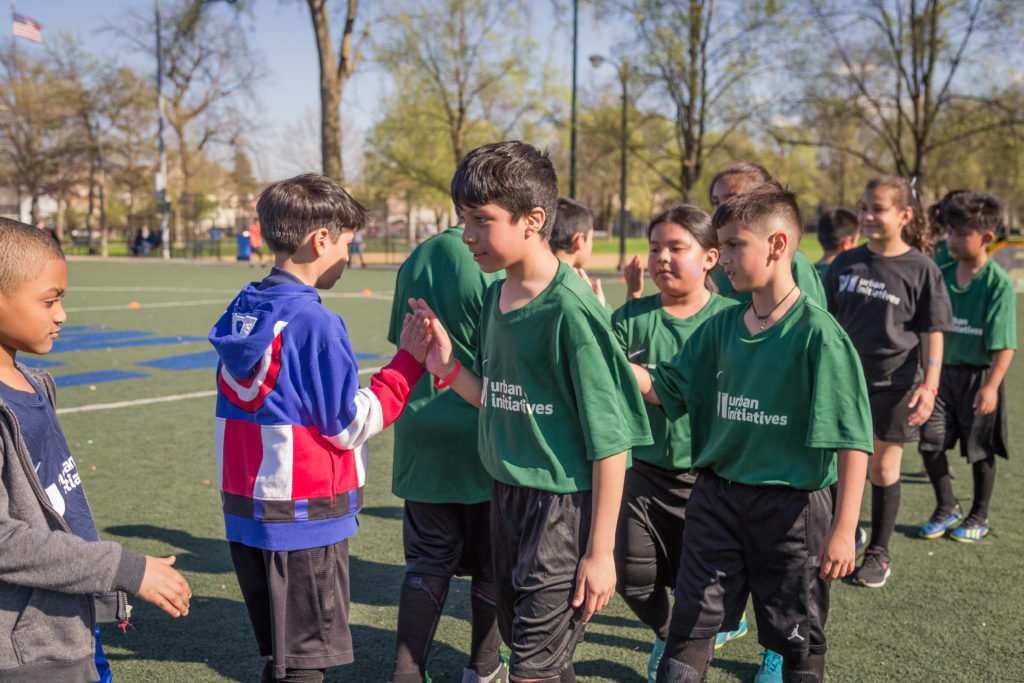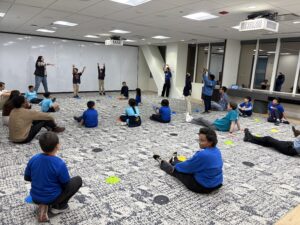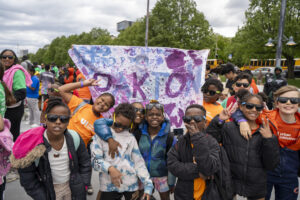Urban Initiatives uses sport and play as a key strategy to positively impact our program participants’ social emotional learning (SEL). SEL is the process by which youth learn and apply the skills needed to regulate their emotions, create and manage goals, show empathy for others, create positive relationships, and make responsible decisions.1 During the school day, one of the most underutilized environments ripe for SEL is recess. Play can have profound impacts on youths’ SEL, and Urban Initiatives has intentionally developed its recess curriculum and overall program approach to positively impact SEL outcomes through intentional, active games and SEL skill-building.
During middle childhood (ages 6-12) school is a key environment where youth develop SEL. The culture of a school at large, individual classrooms, and recess all impact social emotional development. For example, children thrive in environments where they feel safe and respected so school cultures that prioritize cultural competence and cultural responsiveness can produce higher levels of social emotional learning.2 Social emotional learning is also taught in the classroom where teachers have specific standards that dictate key learnings in SEL. In fact, the Illinois State Board of Education (ISBE) sets standards for the SEL content and skills that should be mastered by K-12 students.3 Urban Initiatives utilizes the Collaborative for Academic, Social, and Emotional Learning (CASEL) framework for SEL to inform our curricula and to ensure that our programs are achieving positive SEL outcomes through play.
Recess is no longer universal for all students in the United States and has been frequently cut out of daily school schedules to accommodate more classroom instructional time in order to help teachers meet standardized test goals.4 Chicago Public Schools have defied this trend by mandating 20 minutes of recess each day. However, the challenge to maximize learning opportunities during recess remains.When used intentionally, recess can not only be a time for students to take a break and get some physical activity, but it can also be a time for students to learn SEL more independently than they might in the classroom.
Recess provides opportunities for students to practice skills like conflict de-escalation, self-advocacy, and cooperation through play. Urban Initiatives staff member, Chanelle Tarkington, who has 4 years of experience facilitating UI’s recess program says that, “Students have to deal with so many different situations in recess that it really is a testament to who they are and I think they learn a lot about themselves at recess. Then students go back into the classroom and they know more about what they do like, don’t like, things they are capable of, and things they need to work on.” One of CASEL’s SEL Core Competencies is self-awareness, which includes benchmarks like identifying emotions, accurate self-perception, and recognizing strengths. 5 Recess provides a space for students to master these skills through real-life applications- whether it’s resolving a disagreement about game rules or effectively managing one’s emotions after a tough loss.
An effectively run recess provides a balance of students owning their learning and intentional adult engagement. Urban Initiatives’ recess program strives to create this balance in every recess session. Students are encouraged to utilize their recess time to its fullest by participating in games and activities that encourage physical activity and SEL while adult facilitators work to intentionally engage in ways that promote safety, inclusion, and learning. Adult engagement is so important during recess for many reasons, one of which is to encourage participation from all students. An inclusive recess not only allows every student to gain the benefits of play and feel included in their school community, but it also requires students to include others that may be different from themselves. This adds a level of SEL beyond what students may achieve on their own and builds a more positive culture of inclusion.
Play — and recess in particular — is an excellent opportunity to help students build SEL. Urban Initiatives is implementing high quality recess programming, with an emphasis on SEL, in 25 schools across Chicago, impacting over 14,000 students each day. It is our goal to create strong SEL outcomes, through which students can display prosocial behaviors, be responsible decision makers, and practice self awareness in the classroom, at home, and eventually out in the world as employees and leaders.




